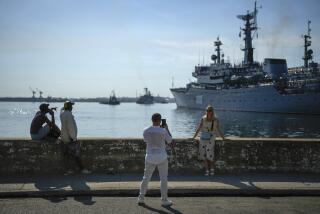Soviets Bump 2 Navy Ships in Black Sea : U.S. Says Act Was Unprovoked, Lodges Protest With Envoy
- Share via
WASHINGTON — Two U.S. Navy warships, under orders to assert international navigation rights, were deliberately bumped by two Soviet warships Friday after moving within 12 miles of Russia’s Black Sea coastline, the Pentagon said.
No one was injured and damage to the two ships was described as light.
But the Administration immediately lodged a strong protest with the Soviet ambassador in Washington, saying the vessels had done nothing provocative and were operating in accord with international law.
“As Secretary of State (George P.) Shultz said just a week ago, we are prepared to deal with the best and worst of Soviet behavior,” said Rudolph Boone, a State Department spokesman.
‘International Commitments’
“We intend to continue exercising our rights under international law. The Soviets are obligated to comply with their international commitments.”
Navy officials said during a Pentagon briefing that there was no question that the cruiser Yorktown and destroyer Caron had been deliberately struck by a Soviet frigate and a smaller coastal patrol boat, respectively.
The Soviet warships broadcast a warning beforehand, saying they were authorized “to strike your ship with one of ours,” said Capt. Gerry Flynn, a top aide to the chief of naval operations.
The two Soviet ships then closed almost simultaneously on the American vessels, “which were, as we would say in the Navy, shouldered out of the way,” Flynn added.
Farther From Coast
The Yorktown and Caron maintained their course and speed despite the bumping, eventually steaming farther from the Soviet coast, Flynn said.
“The latest report I have now is that both ships are operating routinely in the Black Sea as planned,” he said.
Flynn and other Pentagon officials said they could not recall a similar incident of deliberate bumping during operations in the Black Sea. The Soviets strongly protested a similar deployment by the same two ships in March, 1986, but did nothing at the time to physically interfere with their passage.
The Soviet Union claimed Friday that the U.S. Navy ships violated its border, ignored warnings “and dangerously maneuvered in Soviet territorial waters.”
‘A Routine Passage’
“It was a routine passage and we were doing nothing provocative at all,” Flynn countered. “We view (this) with considerable concern.”
According to Cmdr. Richard Schiff, a Navy lawyer who appeared with Flynn, the Yorktown and Caron were operating off the Crimean peninsula in what the Navy calls its “assertion of rights” program--an effort to periodically steam through contested waters to emphasize freedom of navigation on the high seas.
Unlike the United States, which claims a 3-mile territorial limit, the Soviet Union claims a 12-mile limit along its coast, Schiff explained. The United States will accept such a claim, but any country claiming 12 miles “must allow for innocent passage by the ships of all nations,” he said.
The Soviet Union tries to insist that foreign ships stick to specified sea lanes when making an innocent passage, something it has no right to do, the lawyer said.
‘Right of Passage’
“So what our ships were doing there was exercising that right of innocent passage,” Schiff said. He noted that Soviet intelligence-gathering ships routinely operate within 5 miles of the U.S. coastline.
According to the Pentagon, Friday’s incident began with the Yorktown and Caron steaming eastward, parallel to each other and about 3 miles apart, past the Crimean peninsula. The Caron was about 7 miles off the shoreline and the Yorktown about 10.
The two ships had been shadowed by three Soviet vessels and Soviet reconnaissance aircraft ever since entering the Black Sea through the Turkish Straits on Wednesday.
At about 11 a.m. local time Friday--or midnight PST--Flynn said the Soviets broadcast the following warning to the U.S. ships: “Soviet ships have orders to prevent violation of territorial waters. I am authorized to strike your ship with one of ours.”
The Caron responded: “I am engaged in innocent passage, consistent with international law.”
Vessels Were ‘Grazed’
When neither the Caron or Yorktown changed course, a Krivak-class frigate moved up on the Yorktown and a Mirka-class patrol vessel moved on the Caron, “grazing” the left sides of each, Flynn said.
American naval forays into the Black Sea--each of which must be approved by the President--are normally ordered at least once a year for two reasons, said Pentagon officials who asked not to be named:
The Navy ships are expected to monitor Soviet military operations, frequently employing electronic listening gear, and to assert the right of U.S. warships to navigate through those waters.
The Soviet Union considers the Black Sea as its own “lake”--even though it is only one of several nations bordering the sea’s waters--and maintains a large naval fleet there.
According to Boone, Undersecretary of State Michael Armacost called in Soviet Ambassador Yuri Dubinin on Friday morning to “lodge a strong protest.”
More to Read
Sign up for Essential California
The most important California stories and recommendations in your inbox every morning.
You may occasionally receive promotional content from the Los Angeles Times.








